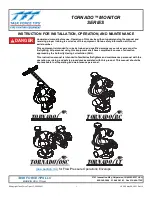
Alarms
●
Technical alarm conditions are triggered by an electrical, mechanical, or other
failure of the equipment, or by failure of a sensor or component. Technical alarm
conditions may also be caused when an algorithm cannot classify or interpret the
available data. The visual manifestation of a technical alarm is active as long as
the reason for that alarm exists.
■
Certain technical alarms can be deactivated with the pause audio key. The
Alarm Deactivation
setting is configured in the
Care Unit Settings
and it
is password protected. For more information, see the CARESCAPE Modular
Monitors Supplemental Information Manual.
Alarm priority levels
Physiological and technical alarms are categorized by priority level:
●
High priority alarms require an immediate response.
●
Medium priority alarms require a prompt response.
●
Low priority alarms require you to be aware of this condition.
●
Informational priority messages provide information you should know.
NOTE
Informational messages are not sent to the network, and
they are never latched.
Alarm priority escalation
An escalating alarm starts at a designated priority level (low or medium) and will
escalate to the next higher priority level of alarm (after a set number of seconds) if the
alarm condition has not been resolved. It is important to note that these escalate up
to the next level but will not reset until the condition has been resolved.
NOTE
Alarm priority escalation affects the currently ongoing alarm
condition, not any future alarms of the same type. Any new
alarms will alarm at their designated priority level, not at the
escalated level.
For more information, see the CARESCAPE Modular Monitors Supplemental
Information Manual.
Physiological alarms’ activation criteria
Physiological alarms have individual activation criteria as shown in the table. Alarm
annunciation does not depend on case activity.
Parameter
Alarm activation criteria
ECG
Active measurement for 30 seconds.
Impedance respiration
Active measurement for 30 seconds.
SpO
2
Active measurement for 60 seconds.
NIBP
Manual
,
Auto
, or
Stat
mode started.
IP
Active measurement for 30 seconds.
Temperature
Active as soon as measurement readings are available.
C.O.
Active as soon as continuous measurement readings are available from the
Unity Network Interface Device (ID).
130
CARESCAPE Modular Monitors
2062971-001
Summary of Contents for CARESCAPE
Page 38: ...38 CARESCAPE Modular Monitors 2062971 001 ...
Page 114: ...Setting up the monitor before use 114 CARESCAPE Modular Monitors 2062971 001 ...
Page 146: ...Alarms 146 CARESCAPE Modular Monitors 2062971 001 ...
Page 218: ...Pulse oximetry 218 CARESCAPE Modular Monitors 2062971 001 ...
Page 234: ...Non invasive blood pressure 234 CARESCAPE Modular Monitors 2062971 001 ...
Page 260: ...Temperature 260 CARESCAPE Modular Monitors 2062971 001 ...
Page 274: ...Cardiac output 274 CARESCAPE Modular Monitors 2062971 001 ...
Page 280: ...Mixed venous oxygen saturation SvO 280 CARESCAPE Modular Monitors 2062971 001 ...
Page 338: ...Patient Spirometry 338 CARESCAPE Modular Monitors 2062971 001 ...
Page 372: ...Neuromuscular transmission 372 CARESCAPE Modular Monitors 2062971 001 ...
Page 404: ...Laboratory data 404 CARESCAPE Modular Monitors 2062971 001 ...
Page 410: ...Calculations 410 CARESCAPE Modular Monitors 2062971 001 ...
Page 416: ...Drug calculations 416 CARESCAPE Modular Monitors 2062971 001 ...
Page 424: ...Trends 424 CARESCAPE Modular Monitors 2062971 001 ...
Page 432: ...Snapshots and events 432 CARESCAPE Modular Monitors 2062971 001 ...
Page 462: ...Cleaning and care 462 CARESCAPE Modular Monitors 2062971 001 ...
Page 528: ...Abbreviations yr year yrs years 528 CARESCAPE Modular Monitors 2062971 001 ...
Page 546: ...Skills checklist 546 CARESCAPE Modular Monitors 2062971 001 ...
Page 547: ...content ...
















































